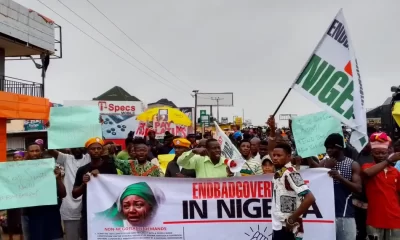National Issues
The ‘Desecration’ of Religious Freedom in Nigeria -By Caleb Onah
Religious leaders, civil society organisations, and educational institutions should collaborate to promote respect for diversity and peaceful coexistence. Education plays a pivotal role in combating religious intolerance, as it can help dispel misconceptions, bias and stereotypes.

Religious freedom is a fundamental human right enshrined in international law, but in Nigeria, a country known for its religious diversity, this cherished freedom is facing increasing challenges. Despite being a secular state, Nigeria has been plagued by incidents of religious intolerance, discrimination, and violence.
The ‘desecration’ of religious freedom not only undermines social cohesion but also hampers the progress and prosperity of the nation. For many years, Nigerians of various faiths coexisted peacefully, allowing religious freedom to flourish.
However, in recent decades, religious tensions and violence have escalated, driven by a combination of factors. These include political manipulation of religious differences, socio-economic disparities, and ‘extremist’ ideologies.
Recently, government authorities and individuals are now taking ‘laws’ and making ‘threatening’ remarks and/or comments on anyone – individuals or groups to deal precisely with anyone who make ‘blasphemous’ statements against their creator and this which is also one of the primary challenges to religious freedom in Nigeria is the rise of ‘extremist’ groups, such as Boko Haram.
In early February 2023, a tragic incident occurred in Kankara local government area, Katsina State, where over 100 individuals lost their lives in violent clashes between armed bandits and local vigilantes. Moving forward to April 7th, another distressing event took place in Tsafe local government area, Zamfara State, where approximately 80 individuals, including women and children, were abducted.
Similarly, on April 16th, in Runji, Kaduna State, armed bandits reportedly demolished 40 houses and mercilessly claimed the lives of 33 individuals. Concurrently, on the very same day, numerous communities in Mangu and Bokkos local government areas of Plateau State fell victim to attacks, resulting in significant casualties.
Since March 2023, there has been a surge in violence between herding and farming communities in Benue and Plateau states. Tragically, on April 5th, a devastating incident occurred in Umogidi, where suspected herdsmen took the lives of at least 46 individuals.
Continuing this distressing trend, on April 7th, a primary school in Mgbam, which served as a home for internally displaced persons (IDPs), became the target of an attack by suspected herdsmen, resulting in the deaths of at least 38 people, including 30 women.
Further reports revealed that on May 15th, in 2023 armed men, allegedly Fulani herdsmen, launched assaults on a minimum of 20 villages in Mangu, leading to the tragic loss of over 100 lives, including numerous women and children.
Not forgetting the popular Islamic Movement in Nigeria (IMN), a Shia Muslim group led by Sheikh Ibrahim Zakzaky. They advocate for the implementation of Islamic law in Nigeria and have had confrontations with the Nigerian government and security forces.
Ansaru, also known as Jama’atu Ansarul Muslimina Fi Biladis Sudan (Group of Supporters for Muslims in the Land of Sudan), is an ‘extremist’ group with links to Boko Haram.
These groups have targeted religious ‘minorities,’ resulting in widespread displacement, destruction of places of worship, and loss of life. Additionally, religious intolerance is fuelled by hate speech, propagated through both traditional and social media platforms. The dissemination of inflammatory messages further polarises our communities and incites violence.
Moreover, the Nigerian legal system, though ostensibly protective of religious freedom, has often failed to address incidents of discrimination and violence.
Cases of forced conversions, denial of worship rights, and the destruction of religious property often go unpunished. This lack of accountability fosters a culture of impunity, perpetuating violations against religious minorities and further eroding religious freedom.
The erosion of religious freedom in our country has far-reaching consequences. It undermines our nation’s social fabric, fostering mistrust and animosity among different religious communities.
This division weakens national unity, making it harder to address common challenges such as poverty, corruption, and insecurity. Additionally, the ‘desecration’ of religious freedom stifles our economic ‘growth’ and ‘development.’
Investors are less inclined to invest in an environment marked by religious violence and instability. Furthermore, the infringement of religious freedom jeopardises Nigeria’s international reputation.
The country’s commitment to upholding human rights, including religious freedom, is a critical factor in its diplomatic relations and global standing. Failure to address this issue adequately risks isolating Nigeria from the international community and hampering its ability to attract foreign investment and assistance.
Addressing the ‘desecration’ of religious freedom in Nigeria requires a multi-faceted approach Firstly; the government, mostly northern governments must demonstrate its commitment to religious freedom by actively enforcing existing laws at the federal level and holding perpetrators accountable. This involves impartial investigations into incidents of violence, prosecution of offenders, and the protection of religious minorities.
Additionally, interfaith dialogue and community engagement initiatives can play a crucial role in fostering understanding and tolerance among different religious groups.
Religious leaders, civil society organisations, and educational institutions should collaborate to promote respect for diversity and peaceful coexistence. Education plays a pivotal role in combating religious intolerance, as it can help dispel misconceptions, bias and stereotypes.
Moreover, our media organisations should exercise responsibility in reporting religious issues. Sensationalism and biased coverage can inflame tensions and contribute to the ‘desecration’ of religious freedom. Journalists should be encouraged to uphold ethical standards, promote dialogue, and avoid the dissemination of hate speech.










